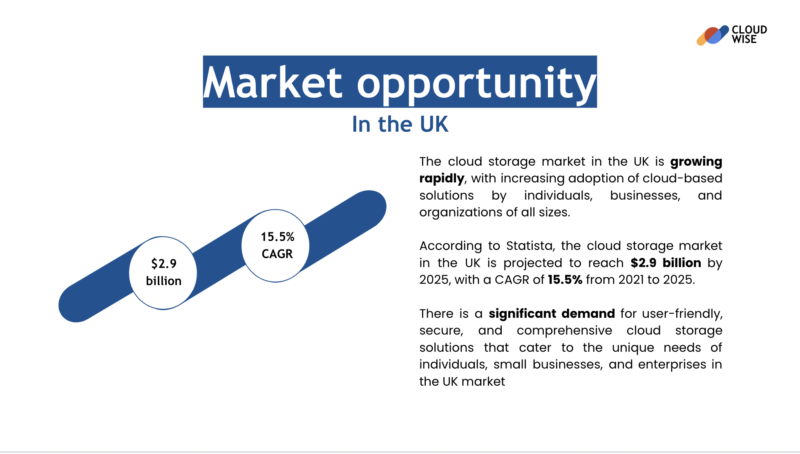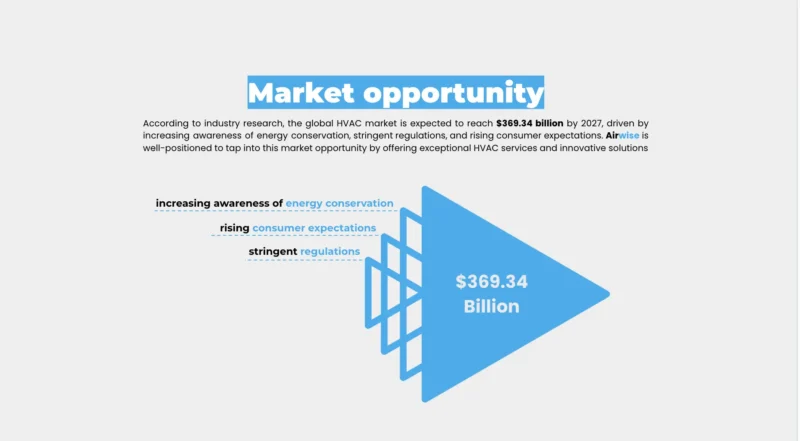Welcome to the world of brewery entrepreneurship, where the art of crafting exceptional beers collides with the thrill of business ventures.
Discover the exciting realm of breweries, where the magic of craft beer blends with entrepreneurial dreams! This article unveils the secret recipe for brewery success: a meticulously crafted business plan.
Venturing into the brewery industry means diving into a world of booming growth and fierce competition. But fear not! A well-crafted business plan is your compass, guiding you through the complexities and uncertainties while helping you brew success like never before.
So, grab your favorite brew, and let’s explore why a brewery business plan is the key to unlocking your beer-filled dreams!
Download Brewery Business Plan Template
As part of our standard pitch deck preparation, we have prepared a downloadable deck that provides an in-depth examination of BrewWise’s approach to financial planning, essential features, market potential, target audience, marketing plan, and financial projections.
*The Albus team offers professionally designed templates of fictional companies that use real content instead of the typical “lorem ipsum” filler text.
Brewery Business Plan Template: Executive Summary
Imagine your brewery as a lively center, humming with friendship and fun, where handcrafted beers take center stage, enticing taste buds and creating enduring memories.
Your vision transcends mere libations; it embraces a purpose-driven journey, celebrating tradition while pushing the boundaries of innovation.
At the core of your brewery lies a powerful mission to create extraordinary craft beers that delight and inspire beer enthusiasts far and wide. Your brewery’s identity becomes synonymous with quality, creativity, and a profound dedication to customer satisfaction.
Defining Objectives
With a firm grasp on your objectives, you are well-equipped to conquer the local market, capturing the hearts of beer aficionados with your unique flavors and exceptional brews. Your ambition stretches beyond city limits, envisioning expansion into neighboring regions and securing a prominent place on the national stage.
As you embark on this thrilling voyage, financial projections serve as a guiding light, ensuring prudent management of costs and a pathway to sustainable profitability. Your business plan charts a course for steady growth, laying the foundation for a thriving brewery enterprise.
In the forthcoming sections, we shall dive deeper into the intricacies of your brewery’s business plan. From comprehensive market analysis to ingenious marketing strategies, we’ll equip you with the tools and knowledge to bring your brewery dreams to life.
So, raise your glass to the adventure ahead – one where craftsmanship and entrepreneurship intertwine to create an extraordinary brewery experience! Together, we’ll set your brewery on a course toward resounding success in craft beer.
Brewery Business Plan Template: Company Description
Begin the company description with a concise and engaging overview of your brewery. Clearly state your brewery’s name, location, and year of establishment. Introduce the founders and key team members, highlighting their expertise and passion for brewing. This section should offer a snapshot of your brewery’s identity and set the tone for the rest of the description.
Share your brewery’s core values and brewing philosophy. Describe the unique attributes that differentiate your beers from others in the market. Whether it’s a dedication to using organic, locally sourced ingredients or an innovative approach to crafting experimental brews, emphasize the essence of what makes your beers stand out and appeal to discerning consumers.
Target Market
Identify your target market and niche within the brewing industry. Outline the demographics and preferences of your ideal customers, demonstrating a clear understanding of the market you intend to serve. Include market research data, if available, to support your claims and showcase the potential demand for your offerings.
Competitive Analysis
Conducting a thorough analysis of your competitors in the local and regional brewing landscape is critical in developing a successful brewery business plan.
By understanding their strengths and weaknesses, you can identify gaps in the market and areas where your brewery can excel. Highlighting your competitors’ strengths will help you learn from their successful strategies while pinpointing their weaknesses will allow you to position your brewery as a better alternative.
Look for opportunities to differentiate yourself, whether it’s through offering a distinctive beer lineup, exceptional customer service, or innovative marketing techniques. Emphasize your brewery’s unique selling points and how they align with the preferences and demands of your target market.
By presenting a well-defined strategy for carving out a unique position within the market, you demonstrate your brewery’s potential for long-term success and growth.
Brewery Operations
Briefly outline your brewery’s production capabilities and capacity. Provide insights into your brewing equipment, production process, and quality control measures. If relevant, include information on potential expansion plans and how you plan to meet the growing demand for your products.
Distribution and Sales Channels
Discuss your distribution strategy and sales channels, providing a comprehensive plan for how you intend to get your exceptional beers into the hands of eager consumers. A well-structured distribution strategy is crucial for reaching a broader audience and maximizing sales potential. Here are some key points to include:
- On-Site Taproom: Outline your plans for an inviting and well-designed on-site taproom where customers can experience your beers firsthand. Emphasize the unique ambiance and personalized experience you will provide to foster a loyal customer base and encourage repeat visits.
- Partnerships with Local Bars and Restaurants: Detail your strategy for establishing strong partnerships with popular local bars and restaurants. Highlight how these partnerships will enable you to showcase your beers to a diverse customer base, reaching beer enthusiasts beyond your immediate location.
- Distribution to Retail Stores: Describe your beer distribution approach to retail stores. Outline your target regions and the steps you will take to secure shelf space in various retail outlets, from boutique beer shops to larger supermarket chains.
Online Sales
In the digital age, e-commerce presents an opportunity for reaching customers far and wide. Discuss your plans for online sales through your brewery’s website or partnering with established e-commerce platforms, offering convenient access to your products.
- Brewery Events and Festivals: Include your strategy for participating in local and regional beer festivals and events. These opportunities allow you to showcase your beers to a larger audience and offer valuable networking prospects within the brewing community.
- Marketing and Promotion: Touch on the marketing initiatives you plan to implement to increase brand awareness and drive sales. This could involve social media campaigns, promotional events, and collaborations with local businesses to enhance your brewery’s visibility.
- Sustainability and Community Engagement: Modern consumers increasingly value sustainability and social responsibility. If your brewery adopts environmentally friendly practices or engages with the local community, emphasize these aspects in the company description. Showcase your commitment to being a responsible and contributing member of the brewing industry.
Products and Services
Breweries are more than just beer hubs. Your brewery’s unique identity, whether leaning towards a restaurant vibe or pure brewery experience, is shaped by your business plan. The craft brews you create and serve, the inviting space you offer to customers, and the food choices you provide collectively craft the trendy brewery experience beer enthusiasts crave.
Some breweries opt for simple packaged snacks like chips, while others boast a full-service kitchen. Moreover, many utilize extra warehouse space to set up miniature arcades or provide fun lawn games like cornhole, creating an enjoyable atmosphere for guests to relish while savoring their drinks at the brewery.
The primary focus remains on the brews, but curating an unforgettable experience entices people to visit and prolong their stay, effectively amplifying the brewery’s potential for on-premises sales.
Funding and Financial Projections
Starting a brewery can be driven by a passion for crafting pilsners or spurred by the desire to create a local hangout. Regardless of your motivation, securing additional funding is often a necessary step. However, before pursuing financing, it is crucial to approach your brewery’s finances with careful consideration, including applying for loans or lines of credit if required.
To help you navigate the financing process effectively, this guide provides valuable insights into various funding options:
- Brick-and-Mortar Banks: Traditional banks offer business loans, and securing financing from a bank can provide stability and competitive interest rates.
- Alternative Loans: Online lenders offer these loans and provide a quicker application process, although they might have higher interest rates.
- Small Business Administration (SBA) Loans: SBA loans can be attractive with favorable terms and lower interest rates.
- Merchant Cash Advances: This funding option offers a lump sum in exchange for a percentage of your future credit card sales.
- Business Lines of Credit: This funding option gives you access to a revolving line of credit that you can use as needed.
- Crowdfunding: Engaging the public to invest in your brewery through platforms like Kickstarter or Indiegogo can be a creative way to raise funds.
- Asking Family or Friends: Personal connections may be willing to invest in your brewery venture, although it’s essential to approach this option professionally.
- Commercial Real Estate Loans: These loans can help finance the real estate acquisition if you’re purchasing property for your brewery.
- Equipment Financing: Specific loans dedicated to acquiring brewing equipment can ease the burden on your initial capital.
- Purchase Order Funding: This option helps cover production costs when you receive large orders but lack sufficient funds to fulfill them.
How to Present Your Brewery Business Plan
Effective communication with investors about your business plan and capturing their interest requires careful preparation and adaptability. As you refine your plan, make an effort to internalize its key takeaways, ensuring you can confidently discuss your vision.
Remember, tailoring your communication to the situation and audience is crucial. Whether you’re at a casual networking event or a formal investor meeting, your message should resonate with the specific context.
To increase your chances of finding interested investors, cast a wide net by sharing your well-crafted business plan with various potential investors and banks.
When you secure a meeting with a potential investor or partner, be ready to deliver a detailed presentation. For a brewery, emphasize the unique experiences that will be at the core of your venture.
It’s essential to anticipate potential questions and prepare thoughtful responses.
During networking events, be genuine and sincere. If you don’t have an immediate answer to every question, focus on showcasing your ability to think on your feet. These qualities are equally valuable to investors as having a detailed plan.
Follow these steps, and you’ll demonstrate your genuine passion for your brewery business; you’ll capture the attention and confidence of potential investors.
Brewery Business Plan: Final Thoughts
Crafting a comprehensive brewery business plan is crucial for success in the dynamic craft beer industry. As you finalize your plan, consider key factors to ensure your brewery thrives. Stay flexible and adaptable to meet changing market trends and preferences. Embrace feedback and refine your strategies to stay relevant and competitive.
When presenting your business plan to potential investors or partners, convey your passion and expertise effectively, emphasizing the unique experiences your brewery will offer. Prioritize exceptional customer service and community-building to create a loyal patron base.
Embrace innovation and creativity, experimenting with new beer styles and hosting engaging events to set your brewery apart. Remember that a business plan is a living document; regularly review and update it as your brewery progresses.
With a well-crafted business plan, unwavering dedication to brewing excellence, and a commitment to customer satisfaction, your brewery can become a beloved destination. The “it” place for beer enthusiasts and a vital part of your community. Embrace the journey ahead, and may your brewery thrive in this exciting and ever-evolving industry. Cheers to a prosperous and fulfilling brewery venture!
Meet The Author Of This Article

Hi! I’m Elsa
I’m a Growth Marketer specializing in supporting small to medium-sized companies to thrive.
I focus on brand, business, and team growth to drive accelerated success.
Currently, I leverage content creation to share my personal growth journey and expertise.


